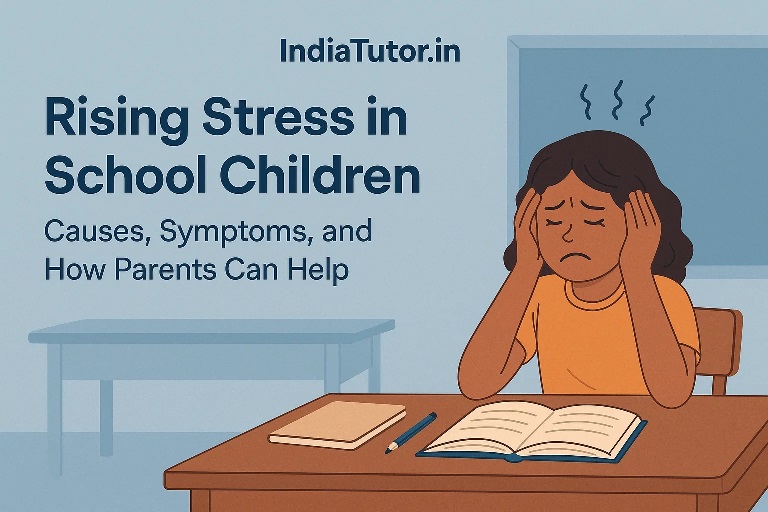As parents, we all want our children to be happy, healthy, and confident learners. However, in recent years, stress among school children has been steadily increasing. According to a 2024 report by UNICEF, more than one in seven adolescents worldwide experience mental health issues, with academic pressure being a major contributor. In India, a survey by the National Institute of Mental Health and Neurosciences revealed that over 25% of school-going children experience high levels of stress due to studies, exams, and performance expectations.
Understanding the causes, recognizing the symptoms early, and taking timely action can make a significant difference in your child’s well-being.
Causes of Rising Stress in Children
Academic Pressure
The competitive nature of today’s education system means children often feel they must excel in every subject. High expectations from schools, peers, and sometimes parents can lead to anxiety and burnout.Excessive Homework and Activities
Many students juggle multiple tuition classes, extracurricular activities, and projects. This packed schedule leaves them with little free time to relax, leading to mental fatigue.Examination Stress
Board exams and competitive entrance tests like JEE or NEET create intense pressure from an early age. Fear of failure can weigh heavily on a child’s mind.Social and Peer Pressure
Children often compare themselves with classmates, whether in academics, sports, or social status. This constant comparison can lower self-esteem.Technology and Screen Overload
While digital tools are important for learning, excessive screen time, social media use, and online gaming can disturb sleep cycles, reduce focus, and increase irritability.Family Issues
Domestic conflicts, financial difficulties, or parental stress can affect children’s emotional stability and increase their anxiety levels.
Symptoms Parents Should Watch For
Stress in children does not always look the same as in adults. Here are some common signs:
Sudden drop in academic performance
Irritability, mood swings, or frequent anger
Avoiding school or making excuses to skip classes
Headaches, stomach aches, or unexplained physical complaints
Difficulty concentrating on studies or tasks
Changes in sleep patterns or appetite
Withdrawal from friends and family activities
If these symptoms persist for more than a few weeks, it may be a sign that your child is struggling to cope.
How Parents Can Help
Encourage Open Communication
Make sure your child feels safe talking about their feelings without fear of judgment. Listen actively and validate their concerns.Set Realistic Expectations
Every child has unique strengths. Avoid comparing them with others and set achievable goals that encourage progress rather than perfection.Help with Time Management
Create a balanced schedule that includes study time, hobbies, exercise, and rest. Teaching children how to prioritize tasks reduces last-minute stress before exams.Promote Healthy Habits
A nutritious diet, regular physical activity, and sufficient sleep can greatly improve mood and concentration. Even a 30-minute walk or light exercise can reduce stress hormones.Limit Screen Time
Encourage offline activities like reading, drawing, sports, or spending time in nature. Less screen time helps improve focus and sleep quality.Teach Relaxation Techniques
Simple practices like deep breathing, mindfulness, or yoga can help children calm their minds before and after stressful situations.Celebrate Effort, Not Just Results
Appreciate your child’s hard work even if the outcome is not perfect. Positive reinforcement builds confidence and resilience.Seek Professional Help if Needed
If your child’s stress levels remain high despite your efforts, consider speaking to a school counselor, child psychologist, or therapist. Early intervention can prevent long-term emotional difficulties.
My Thoughts
Childhood should be a time of curiosity, growth, and joy. While academic success is important, it should never come at the cost of mental health. By creating a supportive environment at home, encouraging open dialogue, and teaching healthy coping skills, parents can help their children navigate challenges with confidence.
As an educator and founder of IndiaTutor.in, I have seen firsthand how the right guidance and encouragement can transform a stressed student into a motivated, happy learner. Let us remember that grades will come and go, but a child’s well-being is priceless.
Nidhi Mehta – Founder – IndiaTutor.in

